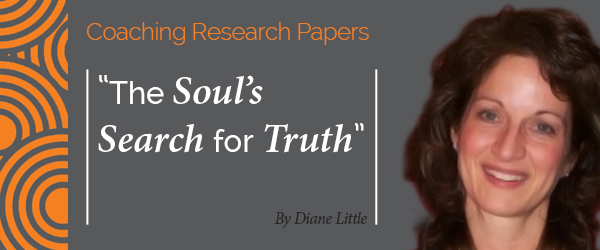Research Paper By Diane Little
(Spiritual Coach, UNITED STATES)
Introduction
Man’s search for self and the quest for the real meaning of life echoes through the ages in the perennial questions of
These and many other forms of the same questions regarding self-doubt, a life without purpose and self-defeating behavior enter the minds and hearts of all of us at some point in our lives. No matter how successful or educated we may be, these hopeless thoughts, feelings, doubts and fears enter our minds spinning around without purpose. They can leave us feeling hopeless and confused.
Most Men lead lives of quiet desperation 1
Henry David Thoreau
In this paper I will explore the ideology that helps us see that the answer to these questions comes from within ourselves; that through coaching we can find our truest self, release judgment and live that peace for which we long.
The “God” in this sense refers to the sustaining force within each of us and in our universe. We may refer to this source as God, Spirit, Soul, Intelligence, the Great Devine, Consciousness or whatever term works best for the reader. These terms may be used interchangeably in this paper.
Faith and reason are like two wings on which the human spirit rises to the contemplation of truth; and God has placed in the human heart a desire to know the truth- in a word, to know himself- so that, by knowing and loving God, men and women may also come to the fullness of truth about themselves. (1998) Pope John Paul II, Fides Et Ratio
THE GENTLE VOICE WITHIN
From his book “THE RHYTHM OF LIFE”, (2004), Matthew Kelly describes a gentle voice within each of us as the voice we hear with great clarity as a child.
It is a voice we happily live by and follow. Most of us are immensely happy at this stage of our lives. As we grow older, we become aware of all the other voices that surround us – the voice of parents, siblings, friends, critics, television, strangers and experts. We become fascinated with these voices and as time passes we begin to become distracted from the gentle voice within. Then we begin to doubt, question and ignore the gentle voice within and gradually, the one true voice grows fainter and fainter. Finally, when the voice within has become so faint we can hardly hear it anymore we are told that we have grown up, we are adults and we are now ready for life…Nothing is further from the truth. (p.45)
By the time we have become adults we are burdened with more false information about our world and ourselves than we can possibly process, we have lost our guidepost of the gentle voice within.
Matthew Kelly, (2004) goes on to say –
The gentle voice within is your truest guide. It has absolutely no self-interest. That is what sets it apart from every other voice in your life. The gentle voice within you is interested in only one thing, helping you become the-best-version-of-yourself. Whether you call it your “conscience” or give it another name, we all have this gentle voice within us. It is our true self, directing us toward our essential purpose.(p.45).
The question then is how do we come to this presence, living in alignment and working, acting and leading from our greatest potential and living out our essential purpose? How do we open the door to this self-actualization and personal magnificence?
SELF-ACTUALIZATON
Wikipedia (Wikipedia, The Free Online Encyclopedia) defines self-actualization as a term that has been used in various psychological theories, often in slightly different ways. The term was originally introduced by the theorist Kurt Goldstein (Wikipedia) for the motive to realize one’s full potential. In his view, it is the organism’s master motive, the only real motive: “
the tendency to actualize itself as fully as possible is the basic drive…the drive of self-actualization.
… However, the concept was brought most fully to prominence in Abraham Maslow’s (Wikipedia) hierarchy of needs as the final level of psychological development that can be achieved when all basic and mental needs are fulfilled and the “actualization” of the full personal potential takes place. …Maslow explicitly defines self-actualization to be
the desire for self-fulfillment, namely the tendency for him [the individual] to become actualized in what he is potentially. This tendency might be phrased as the desire to become more and more what one is, to become everything that one is capable of becoming. (Wikipedia)
A more explicit definition of self-actualization according to Maslow is
intrinsic growth of what is already in the organism, or more accurately of what is the organism itself…self-actualization is growth-motivated rather than deficiency-motivated.
This explanation emphasizes the fact that self-actualization cannot normally be reached until other lower order necessities of Maslow’s hierarchy of needs are satisfied.
